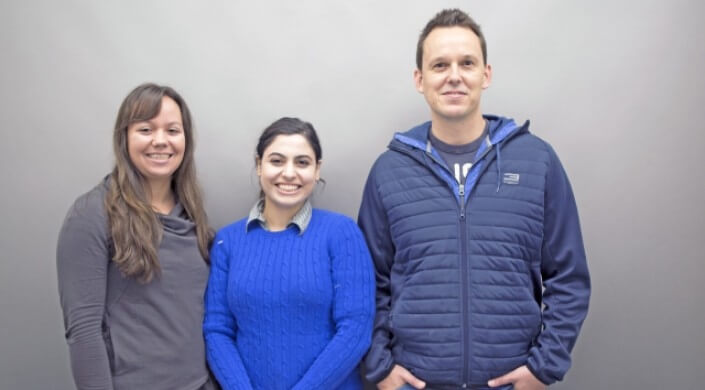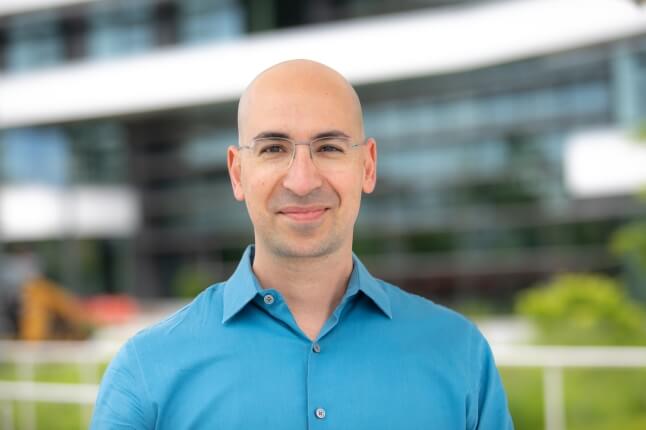News
For their capstone project in Computational Science and Engineering Capstone Project (APCOMP 297R), students (from left) Courtney Cochrane, S.M. '17, Nisreen Shiban, A.B. '17, and David Castineira, S.M. '17, partnered with Biogen to design a computational model that can predict whether a patient will develop Alzheimer’s. (Photo by Adam Zewe/SEAS Communications.)
Alzheimer’s disease is the sixth leading cause of death among U.S. adults, yet the chronic neurodegenerative disease has no cure or effective treatment. The key to developing successful therapies likely lies in early detection, since Alzheimer’s causes neurons and synapses to deteriorate slowly and irreversibly.
With that problem in mind, a team of students in Computational Science and Engineering Capstone Project (APCOMP 297R) joined forces with Biogen to design a computational model that can predict whether a patient will develop Alzheimer’s.
The course is part of the computational science and engineering master’s program, offered by the Institute for Applied Computational Science (IACS) at the Harvard John A. Paulson School of Engineering and Applied Sciences.
“We know that early detection is key. Some studies show that people start developing the disease 20 years before they begin showing any symptoms,” said Nisreen Shiban, A.B. ’17, a human development and regenerative biology concentrator pursuing a secondary in computer science.
This image shows how Alzheimer's disease affects the human brain. (Image courtesy of the National Institute of Aging.)
She and her teammates crafted a machine-learning algorithm using patients’ genetic data, demographic information, and cognitive test results. The genetic data focused on a specific protein biomarker that is linked to Alzheimer’s development.
Using data from two studies, one conducted in the U.S. and one in Australia, the students were able to train and refine the machine-learning algorithm until it could predict Alzheimer’s with 93 percent accuracy.
With the bulk of the data crunching complete, the students came to a realization: their machine-learning tool wouldn’t be much good if doctors and patients aren’t inclined to use it.
“If people aren’t showing symptoms, it is really hard to convince them to go to the doctor,” said Courtney Cochrane, S.M. ’17. “We wanted to find the simplest process possible, in terms of time the patient must spend at a doctor’s office, so they are more inclined to get prescreened at an early age.”
So the team took their model a step further by quantifying how many diagnostic tests and patient visits are necessary to make a strong Alzheimer’s prediction. They created a more sophisticated meta-data classification algorithm, balancing not just how predictive certain patient data are, but how costly those data are to acquire. Cost is calculated in terms of the time a patient must spend taking a test that yields a specific piece of data for the algorithm.
“These cognitive tests can be very exhausting—just question after question to test your memory and mental skills, sometimes for up to 45 minutes,” said Shiban. “The tests are taxing for anyone, but can be especially draining for patients who suffer from cognitive impairments.”
Alzheimer's disease causes neurons and synapses in the brain to deteriorate deteriorate slowly and irreversibly.
Ultimately, the students proposed a diagnostic protocol of four clinical visits with three different diagnostic tests per visit, which yields a result that predicts Alzheimer’s with 87 percent accuracy.
In the future, the algorithm could be adjusted to take into account other factors, such as the financial costs of these tests for patients or hospitals.
The students caution that they are not out to replace doctors with machines; rather, they see this algorithm as a strong validation tool for clinicians. If the predictive model shows a patient is likely to develop the disease, perhaps a doctor will pay closer attention to possible symptoms.
While the future of their algorithm remains unclear, the students are excited for the potential their work has to help Biogen or other biotech companies develop an effective Alzheimer’s treatment.
“Being able to build something that could improve the lives of patients was very rewarding,” said David Castineira, S.M. ’17. “This project taught me that the right algorithms and machine-learning techniques could provide solutions in practically any field. We should not be afraid to try and tackle any complex problem with these tools.”
Topics: Computer Science
Cutting-edge science delivered direct to your inbox.
Join the Harvard SEAS mailing list.
Press Contact
Adam Zewe | 617-496-5878 | azewe@seas.harvard.edu



